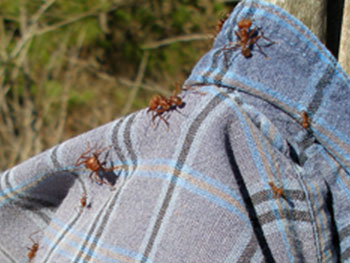Research

Research Summary:
The Mueller Lab aims at understanding the evolution of organismal interactions, particularly the evolution of mutualisms and the evolution of social conflict and cooperation. Current research focuses on the coevolution between fungus-growing ants and their fungi, as well as plants and rhizosphere microbes, but Dr. Mueller admits to an inordinate fondness for any social insect and any mutualistic organism.
Evolution, Ecology, Behavior & Genomics of Social Insects:
Our social-insect research integrates animal behavior, ecology, evolution, genomics, microbiology, and systematics, with a focus on ants. Many projects revolve around the biology of fungus-growing ants, but other social insects such as wild bees, honeybees, and paperwasps are studied as well.
Ecology, Co-Evolution & Genomics of Symbioses:
Our research on host-symbiotic coevolution elucidates patterns of ant-microbe co-cladogenesis, symbiont specificity, symbiont choice, genomic interactions, and the engineering of microbial consortia in ant fungiculture and in human agriculture.
Evolution of Conflict & Cooperation:
Social insects are particularly suitable for the study of evolution in a social context, such as the study of conflict and cooperation within a colony of social insects, between social parasites and their hosts, or between hosts and their macroparasitic and microbial symbionts.
Tropical Biology:
We conduct field research throughout the Neotropics, but primarily at the Smithsonian Tropical Research Institute in the Republic of Panama and at the Centro de Estudos de Insetos Sociais, Rio Claro, SP, Brazil.
Natural History:
We are all enthusiastic about the outdoors and asking research questions firmly rooted in the context of the natural history of our study organisms.

